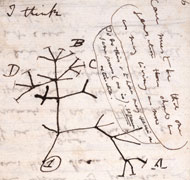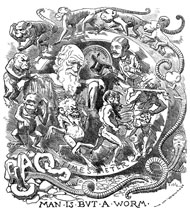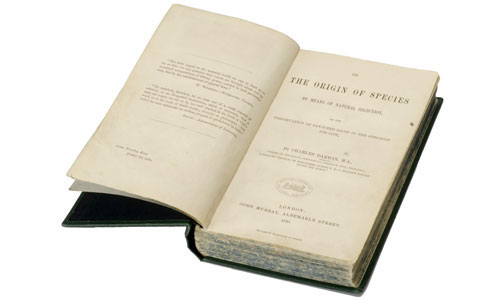On the Origin of Species book
Charles Darwin's book On the Origin of Species changed the way we look at the world. In it he described his theory of evolution by natural selection and in the process created the most important book in biology.

First evolutionary tree sketched by Darwin beneath the words 'I think' in 1837. © Cambridge University Library
Controversial bestseller
On the Origin of species explained how new species evolve. Tiny variations between individuals can give one or the other a competitive advantage, Darwin argued. Generation after generation those tiny advantages are passed down, or selected, until the species eventually changes.
It sounds simple to us now, but when the book was published in 1859 it was truly radical. Then, most people believed God had designed all living things. Suggesting otherwise went against everything they thought they knew.
Not surprisingly, On the Origin of Species sparked a global debate among scientists and the public. The book sold out on the day it was published.

Darwin faced years of controversy after publishing his theory of evolution. This 1882 caricature in Punch magazine is titled 'Man is but a worm'. © Punch Limited / Science Photo Library
Change of plan
Darwin had not intended to publish as early as he did. After spending 20 years working on his theory, agonising over every detail, he had finally persuaded himself to publish his thoughts in a weighty academic book called Natural Selection. But this work was cut short in 1858 when it seemed as if he'd been beaten to it.
Darwin received a letter from Alfred Russel Wallace outlining exactly the same theory. Colleagues advised him to submit a joint presentation to the Linnean Society. This was read at a meeting on 1 July 1858. Neither man was present as Darwin was grieving over the death of his son and Wallace was on an expedition in remote Indonesia.
The public airing of his theory spurred Darwin to press ahead with publication of his work and on 24 November 1859 he published a short version of his book. Its full title was On the Origin of Species by Means of Natural Selection, or the Preservation of Favoured Races in the Struggle for Life. He created 5 updated editions in his lifetime.

Japanese translation of On the Origin of Species, Shu No Kigen, published in 1914 as a 5-volume pocket-sized edition.
Global phenomenon
Darwin was keen for his ideas to reach as many people as possible and for his books to be read in many different languages. Part of its success may have been down to the conversational rather than academic writing style.
On the Origin of Species was so influential that within a year it had been published in German. In Darwin's lifetime it was also translated into Danish, Dutch, French, Hungarian, Italian, Polish, Russian, Serbian, Spanish and Swedish.
Largest collection
The Natural History Museum's library contains the largest collection of Darwin's works in the world. We have 478 editions of On the Origin of Species in 38 languages, including Braille. But none is as precious as the first editions that we care for.
Further information
- Visit a first edition of Darwin's On the Origin of Species book in our new Treasures Cadogan Gallery.
- Uncover more about evolution, what it is and the evidence for it.
- Watch a video about Charles Darwin and learn more about his life and work.
- Find out more about Darwin's pigeons and how they helped him develop his theory of evolution.
Vote for your favourite treasure
Is this your favourite Museum treasure? Let us know by voting in our poll.

